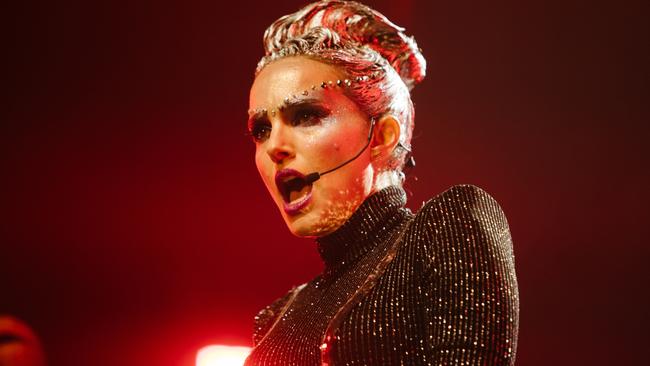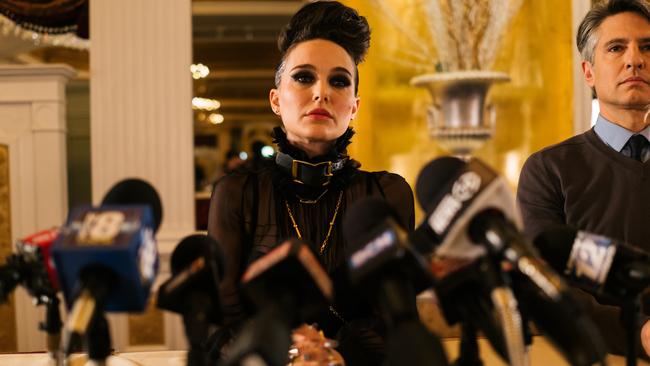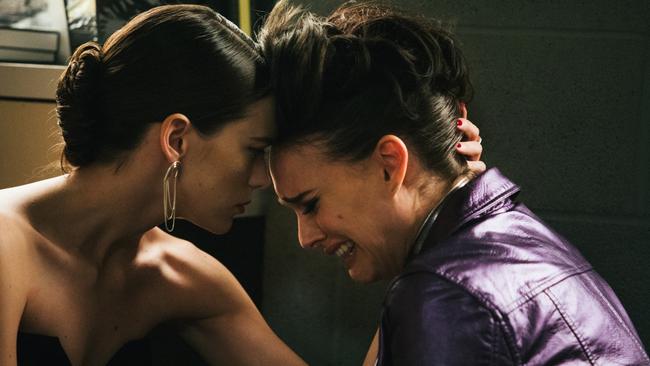A star is torn
Natalie Portman tells how a delay in filming Vox Lux helped her to get a better grip on the spectacular grand finale.

Natalie Portman was immediately intrigued by the screenplay for Vox Lux that writer-director Brady Corbet sent her. It’s a singular, startling angle on the world of a pop performer, and she’d never seen anything like it. “The dialogue was so unusual, and it had such an incredible character voice,” she says. The musical finale, however, was a little more lightly sketched. “It was just written as ‘and then there’s this big show’.”
Fortunately, she adds, the script came with a bonus. Singer-songwriter Sia had already written some songs for the movie and the audio files were there, attached to the email. This, Portman says, helped seal the deal. “It was definitely part of convincing me.” If you’re meant to be playing an international pop sensation who puts on a concert “and you don’t have an iconic pop song, then it will never be believable”.

The concert, she says, filmed in a day and a half, was quite something. Vox Lux begins in darkness and trauma, and the character she plays is a mixture of the brittle and the monstrous. But that finale — whatever you make of its place in the world of the film — was a lot of fun to do, she says. “We actually prepared twice, because the movie was ready to shoot, and then right before shooting it got cancelled because of money stuff. It was three months before it started again, before they got the money together.
“So I prepped it twice, which was kind of fun because then it got to sit in the back of my brain and rest a little bit. And that’s kind of when the best stuff happens, usually.”
Portman’s husband, Benjamin Millepied, choreographed the final show, which made preparation even more straightforward.
Elsewhere in the filming, she says, she experienced a sense of freedom. “Brady really understood how to create an environment for us, so we felt we could do all sorts of different things — be really experimental.”
Corbet, an actor turned director, was ready to allow improvisation.
“We had a camera that would follow us, handheld, and pre-lit spaces and a lot of the scenes we did in one shot, so that we could go from start to finish, which was really rare for actors, and it was really wonderful, and it felt like it came from a place of someone who really understood actors.”
Corbet’s first film, The Childhood of a Leader (2015), focused on almost entirely on the early life of a future fascist: it wasn’t until the final minutes that the character’s adult identity was revealed.
Vox Lux also divides up the life of its central figure, but more even-handedly, between adolescence and adulthood: for more than 50 minutes, Celeste is played by 16-year-old Raffey Cassidy, before Portman takes over.
The difference between the two versions is palpable, particularly when it comes to their voices. Young Celeste is quiet, flat, unemphatic: Portman’s Celeste has a thick New York accent and an assertive, aggressive delivery.
“This voice, it’s her armour,” Portman says. “In the script, it says she’s from Staten Island, so I asked Brady how much he wanted of that, and he said: seriously Staten Island. So I worked on that with a dialogue coach for quite a while.”
Armour is an interesting word to use. Celeste knows all about the need to feel protected: Vox Lux opens with a grim, unnervingly plausible scene of violence. It’s 1999, the year of the Columbine High School shootings, and she is at the centre of a similar event, a sole survivor.
Prompted and supported by her older sister Ellie (Stacy Martin), she performs a song at a memorial event. Taken up by the popular imagination, launched on a musical career, guided by an unnamed manager (Jude Law) and groomed by a record label publicist (Jennifer Ehle), her pop life begins.

She is very serious about what she is doing. She has a philosophy guiding her musical choices. Mounting a defence of pop, she says: “I don’t want people to think too hard. I just want them to feel good.” Yet, it turns out, she’s ready for excess, for exploring the hedonistic tradition of rock ’n’ roll.
Cut to more than 15 years later, and enter Portman’s Celeste, about to launch a new album and perform in her home town.
Once again, Celeste is linked to violence: a terrorist attack at a beach resort in Croatia seems to have included a homage to one of her videos, and one of the questions exercising her management team is how she will publicly respond to the event.
She still has some familiar figures around her, wearily anticipating and managing crises: her manager and publicist are still there, and her sister Ellie remains part of the team. Hovering in the background, there is a new figure: her teenage daughter Albertine (who is also played by Cassidy).
From a performance point of view, there’s no attempt to connect the younger and the older Celeste. “It’s supposed to be quite extreme, the transformation,” Portman says, “they feel like different characters.” Corbet, she adds, “made two bold choices. One was to cast two different people and to double-cast the young Celeste and Albertine.”
The other bold choice, she says, was to make the time jump, and leave much unexplained. “Brady kept saying he did that because he wanted to let the audience fill it in.” There are references, in an occasional voiceover narration by Willem Dafoe, to biographical details that were the stuff of tabloid headlines and social media scandals: drugs, alcohol, a car accident, a stint in rehab. And the audience can fill in whatever similarities they like from whatever pop figure they wish to reference.
Playing Celeste, Portman says, “I think what’s really interesting with her is that she’s always performing, with variations. Whether she’s performing being a mother, or being a tough chick in an interview, or whatever. She’s a constantly performative character.”
Whatever pop-star identifications audiences wish to make, there are also past Portman performances to invoke. In Pablo Larrain’s Jackie, she was JFK’s widow in the aftermath of the assassination, putting on a brave face for the public and for history; in the French feature Planetarium, directed by Rebecca Zlotowski, she was one of a pair of spiritualist sisters caught up in the mysteries of performance and representation; and in her Oscar-winning role in Darren Aronofsky’s Black Swan, she was an obsessive ballet dancer driving herself to the most dramatic of finales.
These connections are there to be made, Portman acknowledges, although she says it’s not something she does herself, certainly not while she’s preparing for a role. “I think there’s an element of public life versus private life, and performance — performance is obviously something I’m drawn to, but I never would have said that in the process of telling you why I chose this. But now, looking back — Black Swan, Jackie, that’s definitely a theme.”
When it comes to Celeste’s relationship with her sister, things are not quite as they seem. Ellie is more musically talented, but it is her sister who has been in the spotlight. Ellie is seemingly at her sister’s beck and call, to be ordered around and exploited; yet when Celeste is at the end of her tether, it’s Ellie she turns to. The power dynamic is not entirely clear: who really needs what from whom in this situation?
“This relationship is so painful, because it’s a mix of family and business,” Portman says. “It’s a really complicated thing, because when you’re in that position, you need someone you trust and love and you know will take care of you, but it’s also complicated when you know they’re making money off you.” There’s a scene towards the end when Ellie is comforting her sister, “but is she really trying to help her, or is she trying to get her back on the treadmill, because everyone’s living is based off that? And I think that’s really painful on both ends to be in that position.”
The film might seem to take a harsh view of the place of pop in contemporary culture, but Portman says she understands what lies behind the young Celeste’s vision of music. “I think we all have that need and desire to enjoy and not think about it all. If you really took in all the hard things in the world, all challenges, you wouldn’t be able to face another day — we all have that need and tendency to shut off.”
At the same time, she says, she is taken aback by the way celebrity culture has been transformed in recent years, “the way that news stories and celebrity gossip and pop culture stories are given the same kind of attention”, how the ticker-tape running across the bottom of the screen on CNN conflates political news and royal baby news. “It’s all a form of spectacle. And there’s power in spectacle.”
Vox Lux is currently screening in cinemas.

To join the conversation, please log in. Don't have an account? Register
Join the conversation, you are commenting as Logout